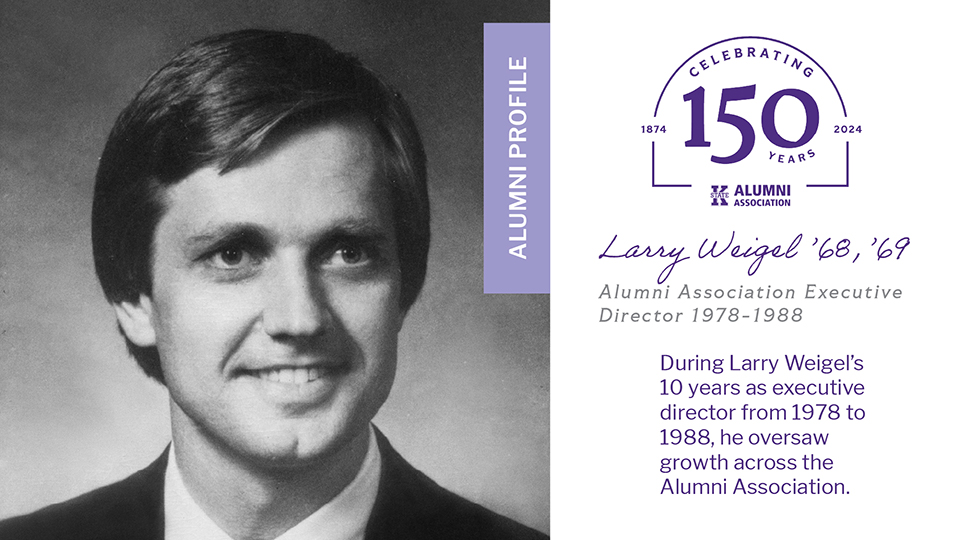Former Alumni Association executive director reflects on organization’s transformation
Larry Weigel ’68, ’69 has worn plenty of K-State hats over the years.
First as a student-athlete playing basketball for legendary coach Tex Winter. Next as a coach working as a graduate assistant for Winter and, later, on the coaching staff for Cotton Fitzsimmons and Jack Hartman. His wife, Kay ’66, ’79, even helped him recruit Lon Kruger ’75 to play for the ’Cats with some homemade BLT sandwiches.
Later Weigel worked for the KSU Foundation before becoming executive director of the K-State Alumni Association. He took over with several goals in mind. Among them were student recruitment efforts; the establishment of the Alumni Fellows program; expansion of the Association’s membership program; changing of records from physical to electronic; and the launch of the credit card program.
“The board of directors had given me a charge to move more away from just social events to university activities and needs,” Weigel said.
During Weigel’s 10 years as executive director from 1978 to 1988 he oversaw growth that took the Association’s annual operating budget from $250,000 to $1 million, and the membership program expanded to 13,000 members. Today, the Alumni Association has an annual operating budget of $5.5 million with approximately 37,000 members.
The launch of the credit card program in partnership with INTRUST Bank in 1986 created a revenue stream to allow the Association to expand its programming and efforts.
“The significance of the bank card is tremendous,” he said. “I had no idea that it would become the income generator that it has been for the Association.”
Regarding enrollment needs, Weigel worked with K-State’s admissions director, Dick Elkins ’56, ’63, to develop more aggressive ways the Alumni Association could help with student recruitment efforts. Weigel and the Association staff, including Amy Button Renz ’76, ’86, would create programming including the Student Alumni Board and Student Ambassadors to aid the Association in these efforts. These students would attend alumni events throughout Kansas and help make connections so that prospective students might enroll at K-State.
The Alumni Fellows program was established in 1983. Since then, the program has honored more than 370 K-State graduates for their contributions to society. Weigel said the idea for the program came from meeting with his peers. A similar program at Penn State had recently been established and was seeing great success and engagement.
“We’d never done that before,” he said. “That opened a whole field of identifying really important people who've done a lot of things and would go on to help K-State.”
Fellows are chosen by each college to return as distinguished guests and as mentors, friends and counselors. They are honored in recognition of the ultimate measure of a university – the quality of its alumni. The program is sponsored by Alumni Association, K-State’s President’s Office and the Dean’s Council.
Weigel left for the private sector to work in financial planning in 1988 having completed 10 special projects and developed 12 new program areas for the Alumni Association.
He and Kay later established an endowed scholarship for students from Ellis County – where they are both from – to attend K-State.
“It's kind of like going back home,” Weigel said. “I was one of the first people in my family to go to college and get a full scholarship and it made a significant difference. Having not only gone to school here, but having worked here in the athletic department, in the Foundation and Alumni Association we got to meet so many nice people through the years and we got to see why giving a scholarship, giving back something is important.”
Some of Weigel’s fondest memories of K-State include interacting with the staff at Hollis House (the former Alumni Association headquarters); presenting Milton Eisenhower ’24, ’63 with the Medallion Award at his apartment in Washington, D.C.; and preparing for the 1982 Independence Bowl – which he jokingly referred to as the “Nightmare in Shreveport” due to the unexpected rainy weather and the logistical challenges planning a bowl trip required at the time.
“It's nice during this 150th celebration to see how far we’ve come, we were crawling,” Weigel said. “I started walking. And then we started running. That's how I see the Association.”

